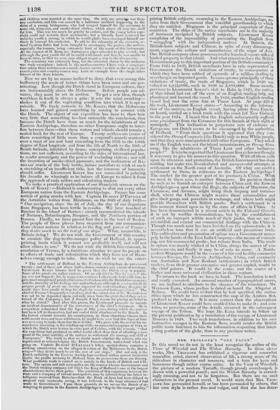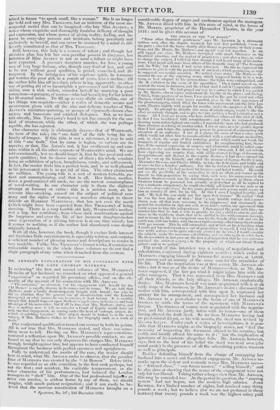MR& TROLLO PE ' S "ONE FAULT. "
Is this novel we do not in the least recognize the author of the Vicar of IVrexhill and The Widow Barnaby. In those clever works, Mrs. Taoseoes has exhibited a vigorous and somewhat masculine mind, shrewd observation of life, a strung sense of the ridiculous in character and manners, and a turn for keen and. humorous though rather coarse satire. In the Vicar of Wrexhill, the picture of a modern Tartuffe, though grossly overcharged, is drawn- with a powerful pencil; and the Widow Burnaby is exceed- ingly amusing, and not to be forgotten. But there are no such characters in the present novel. It would seem that Mrs. TROY.. LORI; has persuaded herself, or has been persuaded by others, that her own style is rather free and vulgar, and that she has deter. rained in future "to speak small, like a woman." She is no longer the bold and racy Mrs. TROLLOPE, but an imitator of the most un- congenial model that can be imagined—the late Miss ArSTEN;
writer whose exquisite and thoroughly feminine delicacy of thought and expression, and whose power of giving reality, feeling, and in- terest to every-day persons and incidents, belong peculiarly and exclusively to herself, and can never be assumed by a mind so dif- ferently constituted as that of Mrs. Taord.orE.
Still, however, this lady is a %vont= of talent ; and though her nistaken plan has left her own peculiar powers in abeyance, her imitation of Miss AUSTIN is not SO total a fitilure as might have been expected. A parson's daughter marries, for love, a young man of very large fortune, who, though very fond of her, and said to be not without good qualities, is proud, conceited, and ill- tempered. By the indulgence of his captious spirit, he torments and worries the poor girl, in a couple of years, into a decline : till the author kills hint off in a duel, (there being, apparently, no other way of getting rid of so incorrigible a personat.re,) and his liberated yiel1111, DOW a rich willow, consoles herself by marrying a poor young man—a paragon, of course—who had been dying for her before her ill-starred union. To fill up so very slight an outline, one of two things was requisite—either a series of domestic scenes and occurrences given with all the nice and delicate touches of MISS AusTEx's miniature-painting, or groups of vigorously-drawn cha- racters and humorous and satirical dialogues. But, as we have said already, Mrs. Taor.tmeE's hand is not tine enough for the one kind of treatment, while the other, of winch she was perhaps capable, she has rejected. One character only is elaborately drawn—that of Wentworth, the hero of the tale; the " one fitult " of the title being his in- firmity of temper. Hillis title is not a misnomer, it may be said of this " one fault," that its name is legion, so various are its aspects; or that, like Aaron's rod, it has swallowed Op and con- tains within it all the other serpents of Wentworth's mind. We are told occasionally, lest we should forget it, that he has good and esti- mable qualities; but he shows none of them ; his whole conduct being an exhibition of spleen, haughtiness, vanity, and self-conceit. Iu filet, the reader finds him a perfect bore, and is as well pleased as his persecuted wife is to get rid of him. The other characters are nullities. The young with is a sort of modern Griselda, pa- tient and uncomplaining, and that is all. Her father, mother, Sister, a good-natured old uncle, See. arc the merest commonplaces of novel-writing. In one character only is there the slightest attempt at humour or satire : this is a maiden aunt, an in- veterate blue-stocking, crazed on the subject of political eco- nomy and the rights of women,—a senseless attempt to throw ridicule on HARRIET MARTINEAU, that has not even the merit (which might have been expected from Mrs. Titom.ora) of being amusing. There is a very terrible old lady, Wentworth's mother,
and a hag, her confidante, front whose clink machinations aaninst the happiness and even the life of her innocent daughter-in-law
some expectation of ii stirring interest is at one time raised ; but it comes to nothing, as if the author had abandoned some design originally formed.
With all this, however, the book, though it excites little interest and furnishes little entertainment, is agreeably written, and contains
a sufficient number of pleasing scenes and descriptions to render it very readable. Unlike Airs. Ito) II r PE'S limner works, it contains no extractable matter : in the whole three volumes we do not find a single paragraph of any value when detached from the context.



























 Previous page
Previous page